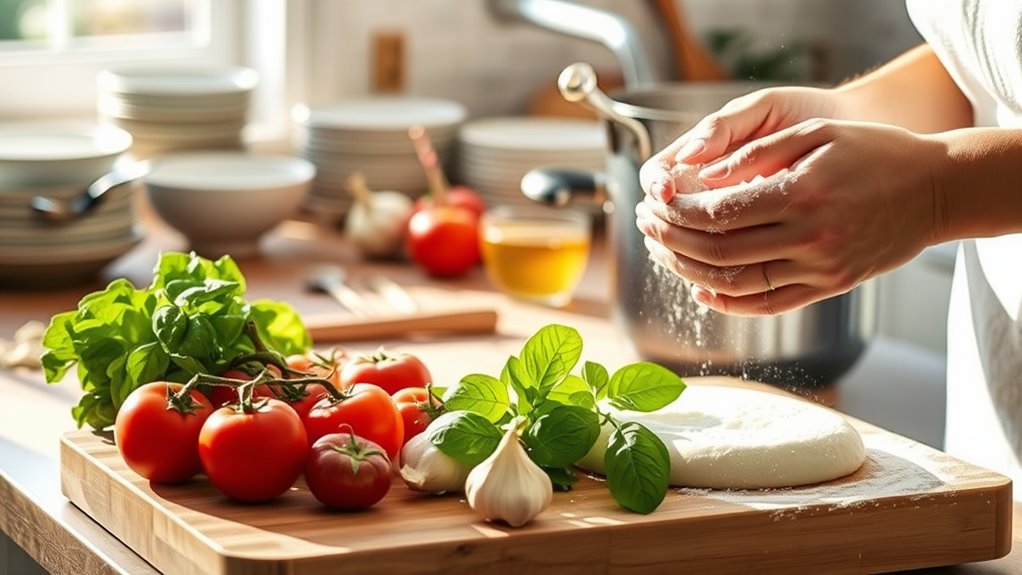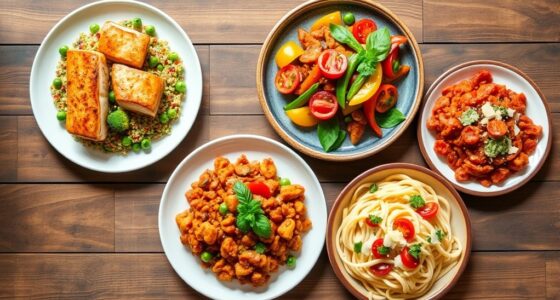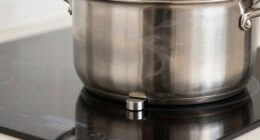Cooking is a powerful form of self-care that nourishes your soul and boosts your mental well-being. By engaging in the creative process of preparing meals, you tap into mindfulness and present-moment awareness. Baking family recipes connects you to cherished memories, while experimenting in the kitchen fosters personal growth. Sharing your culinary creations deepens bonds with loved ones, creating lasting memories. Discover how cooking can transform your life and enhance your emotional health for the better.
Key Takeaways
- Cooking fosters creativity and mindfulness, allowing individuals to be present and engaged in the moment.
- Preparing family recipes enhances emotional connections and cultural identity, providing comfort and warmth.
- Engaging in cooking routines promotes stress relief and boosts mood through a sense of achievement.
- Sharing meals with others builds community, deepening relationships and creating lasting memories.
- Regular cooking as self-care nurtures the soul, supporting overall mental well-being and emotional expression.

Cooking allows you to reconnect with yourself. As you measure ingredients and experiment with flavors, you’re tapping into your creativity. You might find that the act of whisking eggs or kneading dough becomes a meditation, helping you focus on the present. Each stir and sprinkle can ground you, pulling your mind away from stressors. You’re not just cooking; you’re crafting something uniquely yours, and that’s powerful.
Consider how food connects you to memories and traditions. When you cook a family recipe, you’re not only nourishing your body but also honoring your heritage. Each bite can transport you back to a time spent with loved ones, filling you with warmth and nostalgia. In a world that often feels disconnected, cooking can bridge that gap, wrapping you in comfort and belonging.
You might also discover the therapeutic benefits of cooking as you experiment with new recipes. Trying your hand at a complex dish or even baking a simple loaf of bread invites you to focus, learn, and grow. When you succeed, you feel a sense of accomplishment that boosts your mood. If things don’t turn out as planned, it’s an opportunity for growth. You’re practicing patience and resilience, essential skills for life. Incorporating mindfulness practices into your cooking routine can further enhance the calming experience.
Don’t forget the joy of sharing your creations with others. Inviting friends or family to enjoy the fruits of your labor can deepen your connections. Breaking bread together fosters a sense of community and belonging that’s crucial for your mental well-being. You’re not just cooking; you’re creating memories that feed the spirit.
Frequently Asked Questions
How Can I Start Cooking if I Have No Experience?
You can start cooking by choosing simple recipes that interest you. Gather basic ingredients and tools, like a cutting board and a skillet. Watch online tutorials to learn techniques, and don’t hesitate to ask friends or family for tips. Practice makes perfect, so try cooking a dish a few times. Remember, it’s okay to make mistakes; they often lead to the best learning experiences. Enjoy the process, and soon you’ll feel more confident in the kitchen!
What Are Some Easy Recipes for Beginners?
Start with simple recipes like scrambled eggs, pasta with marinara sauce, or stir-fried vegetables. You can also try making a basic salad with your favorite greens, tomatoes, and dressing. For something sweet, bake a batch of cookies using pre-made dough. Don’t forget to check out beginner-friendly video tutorials online; they’re super helpful! Remember, it’s all about having fun and experimenting in the kitchen, so don’t stress too much about perfection.
How Do I Find Time to Cook Amidst a Busy Schedule?
You can find time to cook by planning your meals ahead. Set aside a few minutes each week to create a simple menu and grocery list. Try batch cooking on weekends, so you’ve got ready-to-eat meals during the week. Utilize quick recipes that require minimal prep and cleanup. Don’t hesitate to involve family or friends in meal prep—it makes it fun and efficient. Remember, even 15 minutes can yield a healthy, delicious dish!
Can Cooking Be Therapeutic for Mental Health?
Absolutely, cooking can be a therapeutic escape, like a warm hug on a chilly day. When you chop ingredients or stir a pot, you engage your senses and focus your mind, creating a calming rhythm. It allows you to express creativity and provides a sense of accomplishment. Plus, the act of preparing a meal can boost your mood and help you unwind, making it a valuable tool for improving mental health.
What Kitchen Tools Are Essential for Self-Care Cooking?
Essential kitchen tools for self-care cooking include a sturdy chef’s knife for efficient chopping, a cutting board for safety, and a reliable set of measuring cups and spoons for precise recipe execution. A quality non-stick skillet helps with easy cooking and cleanup, while a heavy pot is perfect for soups and stews. Don’t forget a mixing bowl for prepping ingredients. With these tools, you’ll enjoy a more enjoyable and fulfilling cooking experience.
Conclusion
Just like a gardener tending to their plants, you nurture your soul through cooking. Each ingredient is a seed, and every meal is a blossoming flower, bringing beauty and nourishment to your day. As you stir, chop, and season, you’re not just creating food; you’re cultivating joy and warmth within yourself. So, embrace the kitchen as your sanctuary, where the simple act of cooking transforms into a ritual of self-love and rejuvenation, feeding both body and spirit.









